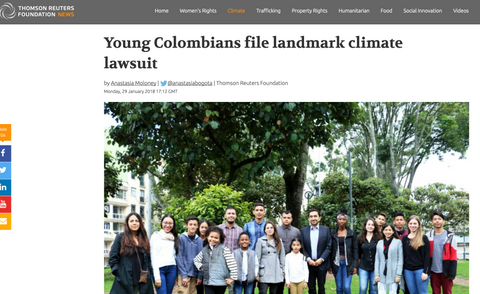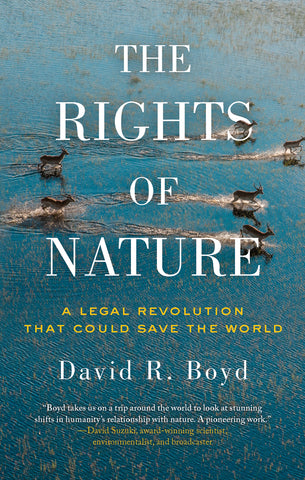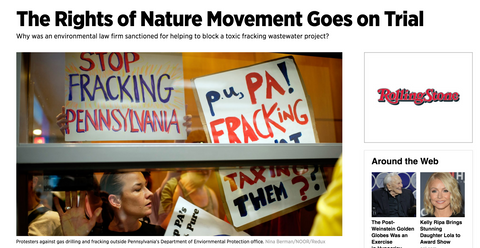Dr. David R. Boyd's latest book is a pivotal and vital part of one of the most important discussions around the environment today: the need for humans to recognize, enforce, and defend the legal rights of nature. This includes everything from animals to ecosystems, our mountains, rivers, and forests.
The Rights of Nature: A Legal Revolution That Can Save the World has been dubbed a “real-life legal thriller” by David Suzuki; Leonardo DiCaprio Foundation CEO Terry Tamminen says that “The rights of nature movement is needed now more than ever . . . David Boyd compellingly helps to chart that journey”; and Publishers Weekly gives the book a starred review:
“Expertly written case studies in which legalese is accessibly distilled . . . are empowering reminders that the seemingly inevitable slide toward planetary destruction can be halted. Boyd persuasively shows that treating the law as an evolving instrument, combined with public-awareness campaigns and political pressure, can help curb humanity’s worst excesses.” — Publishers Weekly
Around the world, more and more laws are being passed recognizing that ecosystems — rivers, forests, mountains, and more — have legally enforceable rights. And if nature has rights, then humans have responsibilities.
----------------
We’ve scoured the internet to find news articles that discuss the phenomenon of nature gaining legal rights. We’re heartened by these amazing stories, and how they pave the way for more groundbreaking protections. Coupled with the compelling arguments in Dr. Boyd’s book, this information arms us to make a difference — there is renewed hope in the survival our planet. Check them out below, and join the conservation (err, conversation)!
New Zealand river Whanganui first in the world to be granted legal human status
March 2017
BBC News
“The recognition allows it to be represented in court proceedings. [The settlement] also included $80m (£65m) in financial redress and $30m (£25m) to a fund to improve the river's health.”
New Zealand's Whanganui River granted legal status as a person after 170-year battle
ABC Australia News
“Mr Finlayson said the approach to granting a river legal personality was unique.
‘It responds to the view of the Iwi of the Whanganui River which has long recognised Te Awa Tupua through its traditions, customs and practise.
‘This legislation recognises the deep spiritual connection between the Whanganui Iwi and its ancestral river and creates a strong platform for the future of Whanganui River.’ ”
---------------------
Corporations Have Rights. Why Shouldn't Rivers?
New York Times
“Denver lawyer] Mr. Flores-Williams characterized the suit as an attempt to level the playing field as rivers and forests battle human exploitation. As it stands, he said, ‘the ultimate disparity exists between entities that are using nature and nature itself.’
Imbuing rivers with the right to sue, he argued, would force humans to take care of the water and trees they need to survive — or face penalties. ‘It’s not pie in the sky,’ he said of the lawsuit. ‘It’s pragmatic.’”
---------------------
Comment: Should B.C.’s killer whales have legal rights?
Victoria TimesColonist
“It is painfully obvious that DFO’s current approach is not working. The southern resident killer whales face imminent extinction. This is an emergency. We need new ideas that will compel meaningful action.
One such idea is that orcas need legally enforceable rights. Rights have the power to modify our beliefs, culture and behaviour, as abolitionists, suffragettes and Indigenous people can attest.
Just a few years ago, suggesting that whales ought to have legal rights might have provoked puzzled looks or even ridicule.
The idea is no longer funny or far-fetched.”
---------------------
Murder most foul: polluted Indian river reported dead despite 'living entity' status
The Guardian
“The decision to grant living entity status to the river this year was met with fanfare, but will do little to improve its state, says Ritwick Dutta, a Delhi-based environmental lawyer.
The court granted the Yamuna certain rights, but gave legal guardianship to senior members of the state bureaucracy. Dutta says that represents a clear conflict of interest. ‘If a hydropower project comes up for consideration, whose side will the bureaucrat take? The river’s or the government’s?
‘It’s got symbolic value,’ he says of the decision. ‘But in reality, it may not mean much.’ ”
----------------------
PETA, photographer reach settlement in lawsuit over monkey selfie
Toronto Star
PETA asks that 25% of proceeds from famous monkey selfie be donated to research & conservation efforts for the species
“The People for the Ethical Treatment of Animals (PETA) sued on behalf of the macaque monkey in 2015, seeking financial control of the photographs for the benefit of the monkey named Naruto that snapped the photos with Slater’s camera.
‘PETA and David Slater agree that this case raises important, cutting-edge issues about expanding legal rights for non-human animals, a goal that they both support, and they will continue their respective work to achieve this goal,’ Slater and PETA said in a joint statement.”
Read the full article---------------------
Ganges and Yamuna rivers granted same legal rights as human beings
The Guardian
“The decision, which was welcomed by environmentalists, means that polluting or damaging the rivers will be legally equivalent to harming a person. [...]
‘There are already 1.5bn litres of untreated sewage entering the river each day, and 500m litres of industrial waste,’ [Himanshu Thakkar] said.
‘All of this will become illegal with immediate effect, but you can’t stop the discharge immediately. So how this decision pans out in terms of practical reality is very unclear.’ ”
--------------------
How Community-Led 'Rights of Nature' Initiatives Are Protecting Ecosystems
Shareable.net
5 examples of recent efforts from the community to recognize nature's rights
“In 2008, Ecuador's leadership rewrote its constitution to include the rights of nature, effectively awarding legal rights to the environment. This change was led by many grassroots environmental advocates [...] Indigenous communities have recognized the rights of nature for thousands of years, but Ecuador was the first country to make it a constitutional right by awarding ecosystems legal rights to protect the environment and its people.”
---------------------
Should we stop keeping pets? Why more and more ethicists say yes
The Guardian
“From the animals that become dog and cat food and the puppy farms churning out increasingly unhealthy purebred canines, to the goldfish sold by the bag and the crickets by the box, pet ownership is problematic because it denies animals the right of self-determination. Ultimately, we bring them into our lives because we want them, then we dictate what they eat, where they live, how they behave, how they look, even whether they get to keep their sex organs.”
--------------------
Now rivers have the same legal status as people, we must uphold their rights
The Guardian
Ganges, Yamuna, and Whanganui rivers have legal standing in their own rights; how do we maintain/change attitude?
“What does it mean for a river to have the rights of a person? If the most fundamental human right is the right to life, does it mean the river should be able to flow free, unfettered by obstructions such as dams? Does the right extend to all creatures in the river system? How can a river, with no voice of its own, ensure such rights are upheld or ask for compensation if they are violated? Who would receive any compensation? And can such rights undo past wrongs?”
--------------------
Ganga is now legally a person! Uttarakhand HC recognizes River Ganga as first living entity of India.
India.com
“Uttarakhand High Court has directed the Centre to recognize River Ganga and River Yamuna as living entities of India. The court also ruled the government to form a Ganga Administration Board for cleaning and better maintenance of the most important and scared river of the country.”
--------------------
The western idea of private property is flawed. Indigenous peoples have it right
The Guardian
“At their core, these decisions recognize what indigenous people have believed all along: that land and water are sacred, living relatives and ancestors whose well-being humanity depends upon for our continued health and existence upon this earth.”
----------------------

“In the 20 years of her life, Cecilia was displayed in a cubicle at a zoo in Mendoza, Argentina, which was closed to the public last year after a series of animal deaths.
Her confinement traumatized her and she got worse when some fellow chimps died that she had shared her life with, Camila Gentile, a veterinarian who has worked at the sanctuary for 12 years, told EFE.
‘They’re like humans, they get depressed and those psychological traumas are much worse than physical ones, and Cecilia’s is psychological: the depression of living a long time alone…that’s harder to get over,’ she said.
The judge handling the case ruled in an unprecedented sentence that Cecilia has ‘non-human rights, cannot be enslaved for life, and has the right to live with her equals,’ [Pedro Alejandro] Ynterian recalled.”
----------------------
Uttarakhand HC Declares Air, Glaciers, Forests, Springs, Waterfalls Etc. As Legal Persons
LiveLaw.in
“Explaining the concept of ‘juristic person’, the bench said a juristic person, like any other natural person, is in law also conferred with rights and obligations and is dealt with in accordance with law.
‘In other words, the entity acts through a designated person. For a bigger thrust of socio-political-scientific development, evolution of a fictional personality to be a juristic person becomes inevitable. This may be any entity, living inanimate, objects or things. It may be a religious institution or any such useful unit which may impel the Courts to recognize it,’ it said.”
----------------------
Toxic Fracking Wastewater: The Rights of Nature Movement Goes on Trial
Rolling Stone
“At the heart of the issue is the American public’s growing dismay over the expanding fortunes and constitutional rights of corporations. CELDF’s mission has been to rejigger the system in favor of communities and the environment, and lessen the power of corporations. Judge Baxter’s decision puts a kink in CELDF’s agenda, and deals a subtle blow to at least one branch of the general resistance that has blossomed under the Trump Administration.
CELDF has focused their work in Pennsylvania, where they’re based, but has also been working with communities in Ohio, New Hampshire, Colorado, Virginia, Washington and Hawaii to, as their website states, ‘establish rights for people and nature over the systems that control them.’”
----------------------
Young Columbians file landmark climate lawsuit
Thompson Reuters Foundation News

“The lawsuit, filed at a Bogota court, alleges the government’s failure to stem rising deforestation in Colombia puts their future in jeopardy and violates their constitutional rights to a healthy environment, life, food
‘Deforestation is threatening the fundamental rights of those of us who are young today and will face the impacts of climate change the rest of our lives,’ the 25 plaintiffs, whose ages range from seven to 26, said in a joint statement.
‘We are at a critical moment given the speed at which deforestation is happening in the Colombian Amazon. The government’s lack of capacity and planning
It is the first climate change litigation in Latin America, according to the Bogota-based rights group, Dejusticia, which is supporting the plaintiffs’ case.
The lawsuit follows a recent surge in litigation around the world demanding action or claiming damages over the impact of climate change - from rising sea levels to pollution.”














